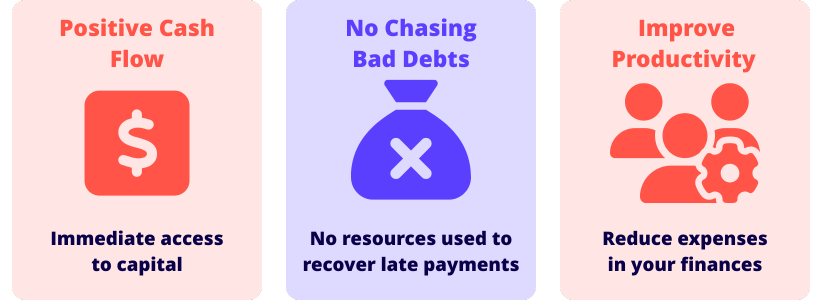Invoice finance factoring, also known as debt factoring, is a short-term financing solution where a business sells its accounts receivable or unpaid invoices to a third party. While invoice factoring is a legitimate way to increase cash flow when your outstanding payments are hurting your business, it is important to understand how invoice factoring works.
What is invoice finance factoring?
Invoice factoring is a process where a business increases its cash flow or capital by selling its outstanding invoices to a third-party factor. The invoice factoring company pays a large percentage of the value of the accounts receivable and provides the rest (minus fees) once the debts have been collected.
Invoice factoring is often considered a last resort for businesses struggling to collect or resolve bad debts or those that require immediate funds to support their operations.
Invoice factoring vs Invoice discounting
Invoice factoring is the process of selling your accounts receivable to a third party. Once this is done, you lose control of your remaining invoice amounts. While it provides an immediate solution to poor cash flow, there is the issue of no longer having control over the debts owed. Factoring services are known to be heavy-handed in their approach to collecting debts, which could lead to the loss of a customer and the potential damage to your business reputation. It should also be noted that whether the whole amount is collected or not, you are liable for the costs and fees of the third party.
Invoice discounting is a type of invoice finance that differs from factoring, as you don’t sell your accounts receivable; instead, you take a loan against them. The financier of the loan is generally a bank or similar financial institution. Using invoice discounting, you still retain control over your accounts receivable. However, customers who eventually pay do so against the loan and directly to the financier.
Is invoice discounting a bank loan?
While invoice discounting is a service provided by banks or lending institutions, it is not considered a bank loan. The value of your accounts receivable is used as a line of credit by the service provider.
Benefits of using a factoring company

While you lose control over your accounts receivable (and potentially lose customers because you used a factoring business), the benefits can sometimes outweigh the negatives.
Positive Cash Flow
The immediate benefit of invoice factoring is access to funds that can increase your cash flow. With the extra funds available, you can continue with your business operations, provide working capital for projects and business growth, or engage in other business finance-related activities.
No more chasing bad debts
Once you have enlisted factoring services, they become responsible for chasing the debt as you have sold your accounts receivable to them. This clears out your bad debt expenses, essentially giving you a ‘clean slate’. There is also the added benefit that you are no longer committing resources to recover payment from customers who have little intention of paying.
Improve productivity
Customers who don’t pay or fail to make payments for services provided are considered bad debt, which falls under the expenses category in your accounting. Clearing expenses that impact your bottom line will provide you with more accurate financial statements.
Bottom Line
Invoice factoring can be a quick solution to poor cash flow, providing you with immediate working capital for your business operations. While the negatives of losing customer relationships and accounts are real, the positives may very well outweigh them. You can factor any changes into your accounts using accounting software, so your business is prepared for any scenario.











































